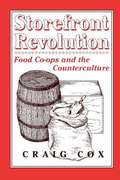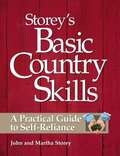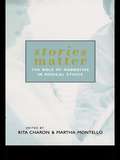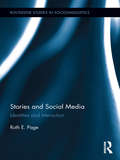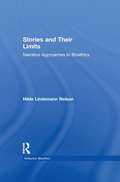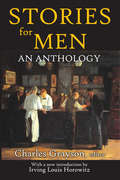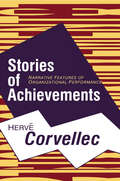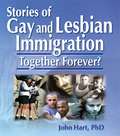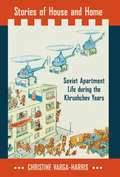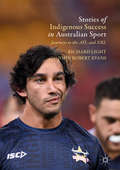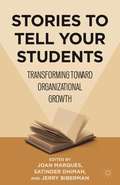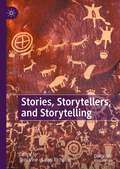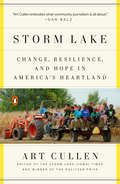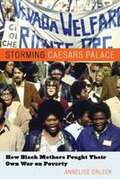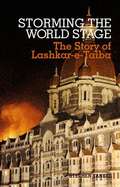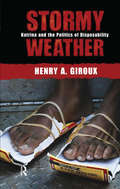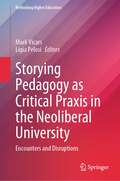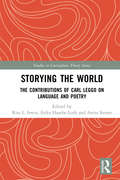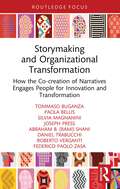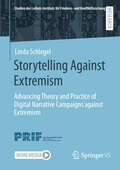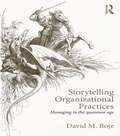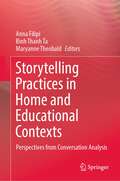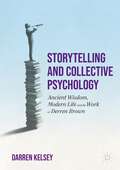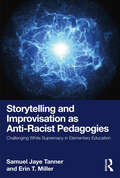- Table View
- List View
Storefront Revolution: Food Co-ops and the Counterculture
by Craig CoxThis book presents a detailed history of the food co-ops in Minneapolis in the 1970's.The co-ops gave activists a place where they could both express themselves and accomplish at least some small-scale changes.
Storey's Basic Country Skills: A Practical Guide to Self-reliance
by John Storey Martha Storey Storey Books StaffWhether you live on a small suburban lot or have a many acres in the country, this inspiring collection will empower you to increase your self-sufficiently and embrace a more independent lifestyle. A variety of authors share their specialized knowledge and provide practical instructions for basic country skills like preserving vegetables, developing water systems, keeping farm animals, and renovating barns. From sharpening an axe to baking your own bread, you'll be amazed at the many ways learning traditional skills can enrich your life.
Stories Matter: The Role of Narrative in Medical Ethics (Reflective Bioethics)
by Martha Montello Rita CharonFirst published in 2002. Routledge is an imprint of Taylor & Francis, an informa company.
Stories and Social Media: Identities and Interaction (Routledge Studies in Sociolinguistics)
by Ruth E. PageThis book examines everyday stories of personal experience that are published online in contemporary forms of social media. Taking examples from discussion boards, blogs, social network sites, microblogging sites, wikis, collaborative and participatory storytelling projects, Ruth Page explores how new and existing narrative genres are being (re)shaped in different online contexts. The book shows how the characteristics of social media, which emphasize recency, interpersonal connection and mobile distribution, amplify or reverse different aspects of canonical storytelling. The new storytelling patterns which emerge provide a fresh perspective on some of the key concepts in narrative research: structure, evaluation and the location of speaker and audience in time and space. The online stories are profoundly social in nature, and perform important identity work for their tellers as they interact with their audiences - identities which range from celebrities in Twitter, cancer survivors in the blogosphere to creative writers convening storytelling projects or local histories. Stories and Social Media brings together the stories told in well-known sites like Facebook and lesser-known community archives, providing a landmark survey and critique of personal storytelling as it is being reworked online at the start of the 21st century.
Stories and Their Limits: Narrative Approaches to Bioethics (Reflective Bioethics)
by Hilde Lindemann NelsonFirst published in 1998. Routledge is an imprint of Taylor & Francis, an informa company.
Stories for Men: An Anthology
by Bruce L.R. SmithCan the reading public imagine a less likely but more needed book than Stories for Men - a seventy-five-year- old anthology edited by Charles Grayson - written in an age when such a title would scarcely raise an eyebrow! Imagine a book about men in which the featured theme is not rapists, child abusers, or men who never weep, feel little sorrow, or prefer dog fighting to baseball.To say the least, this is a counter-cultural collective portrait necessary in today's politically correct world. The original editor, Charles Grayson, hit the nail on the head in his ""explicit"" opening remarks. ""The only claim we make for this book is that it doesn't pretend to offer the best, or the finest, in the world's foremost short stories by contemporary masters. Simply it is just a bundle of yarns by present day American writers, each dealing with a different phase of the actions and activities of men, designed for good reading."" The text fulfills its mission.The work features little known short stories by such major writers as Erskine Caldwell on racial relations, James M. Cain on murder, James T. Farrell on street life, Dashiell Hammett on men and divorce, Ring W. Lardner on baseball, Damon Runyon on football, William Saroyan on horseracing, Thomas Wolfe on travel, William Faulkner on foreigners, among many others. For readers interested in a slice of America, this will be a book of inestimable value as well as personal pleasure. Stories for Men will prove ideal.
Stories of Achievements: Narrative Features of Organizational Performance
by Hervé CorvellecPerformance is the yardstick by which the quality of individual and collective human effort is assessed. Everywhere, performance shapes the lives of people and organizations according to its logic and demands. The quest for performance has spread to societies worldwide; it has become of central importance for our perception of our activities and our understanding of the world. Such importance calls for reflection within the context of organizations. First, all important social processes are strongly affected by organizations. Second, performance holds a commanding position in organizations.In Stories of Achievements, Herve Corvellec explains performance as a matter of telling, recounting, and communicating an organization's actions or the results of those actions. He describes how organizations work with the notion of performance and examines its connections with efficiency and competition. Corvellec begins with an assessment of management literature, discussing the various ways different professions define performance. What is considered to be performance in one profession may be at odds with its definition in another. The author examines what performance means in the world of sports, and provides a look at performance throughout sports history. He then draws parallels between sports and organizations, detailing similarities and differences between performance and the notions of competitions, measurement and hierarchy.This study covers particular aspects of the notion of performance—linguistic, semantic, theoretical, logical, historical, and narrative. Drawing on various methodologies, each chapter represents a smaller study of how performance is manifested in a particular context. Together, they provide a general presentation of how the notion of performance is used in organizations, where it comes from, and what is meant by performance in general managerial discourse. Stories of Achievements will be engrossing reading for management, accounting, and organization professionals, as well as sociologists interested in the study of economic organizations.
Stories of Gay and Lesbian Immigration: Together Forever?
by John HartShare the personal stories of gay and lesbian couples who immigrated to Australia!This fascinating book examines the Australian government’s innovative immigration program for same-sex couples. Covering the time from the early 1980s to 2000, Stories of Gay and Lesbian Immigration: Together Forever? offers a powerful glimpse into the gains and costs of immigration. Its twenty-year span offers insight into both immediate and long-term implications of this policy.Stories of Gay and Lesbian Immigration intertwines the personal stories of gay and lesbian immigrants, including the author, with thoughtful, detailed political analysis. This groundbreaking book analyzes the Australian government’s reasons for recognizing the validity of same-sex couples. It also scrutinizes the emotional and social implications of government policies for these couples.Stories of Gay and Lesbian Immigration explores the issues immigrant same-sex couples faced, including: HIV/AIDS proving homosexuality migration stress dealing with bureaucracy financial dependency success and failure in relationshipsStories of Gay and Lesbian Immigration will be of interest to political scientists, historians of gay and lesbian culture, policymakers seeking to change immigration laws, and anyone interested in this aspect of gay and lesbian relationships.
Stories of House and Home: Soviet Apartment Life during the Khrushchev Years
by Christine Varga-HarrisStories of House and Home is a social and cultural history of the massive construction campaign that Khrushchev instituted in 1957 to resolve the housing crisis in the Soviet Union and to provide each family its own apartment. Decent housing was deemed the key to a healthy, productive home life, which was essential to the realization of socialist collectivism. Drawing on archival materials, as well as memoirs, fiction, and the Soviet press, Christine Varga-Harris shows how the many aspects of this enormous state initiative—from neighborhood planning to interior design—sought to alleviate crowded, undignified living conditions and sculpt residents into ideal Soviet citizens. She also details how individual interests intersected with official objectives for Soviet society during the Thaw, a period characterized by both liberalization and vigilance in everyday life.Set against the backdrop of the widespread transition from communal to one-family living, Stories of House and Home explores the daily experiences and aspirations of Soviet citizens who were granted new apartments and those who continued to inhabit the old housing stock due to the chronic problems that beset the housing program. Varga-Harris analyzes the contradictions apparent in heroic advances and seemingly inexplicable delays in construction, model apartments boasting modern conveniences and decrepit dwellings, happy housewarmings and disappointing moves, and new residents and individuals requesting to exchange old apartments. She also reveals how Soviet citizens identified with the state and with the broader project of building socialism.
Stories of Indigenous Success in Australian Sport: Journeys to the AFL and NRL
by Richard Light John Robert EvansThis book presents journeys of sixteen Indigenous Australian athletes from their first touch of a‘footy’ to the highest levels of Australian football and rugby league, conceptualized as a processof learning. The authors challenge simplistic explanations of Indigenous success in Australianfootball and rugby league, centered on the notion of the ‘natural athlete’. The book tracesthe development of Indigenous sporting expertise as a lifelong process of learning situated inlocal culture and shaped by the challenges of transitioning into professional sport. Individually,the life stories told by the participants provide fascinating insights into experience, cultureand learning. Collectively, they provide deep understanding of the powerful influence thatAboriginal culture exerted on the participants’ journeys to the top of their sports while locatingindividual experience and agency within larger economic, cultural and social considerations.Stories of Indigenous Success in Australian Sport will be of interest to students and scholarsacross a range of disciplines including Indigenous studies, physical education, education, sportmanagement and sociology
Stories of the Indian Immigrant Communities in Germany: Why Move?
by Amrita DattaThis book tells the stories of Indian immigrants in Germany, including Blue Card holders and students categorized as highly skilled migrants, as well as others choosing shadow migration pathways in order to leave the country. It investigates their motivations for leaving India and choosing Germany as an immigration destination. Grappling with the stories of tech workers fleeing the pandemic, activists fleeing the witch hunting of the government, women escaping gender(ed) violence and queer people seeking freedom, this book uses reflexivity as an analytical tool. Investigation of their transcultural practices also reveals a general intent among Indians to create homes in Germany, despite several challenges to such efforts, including structural and everyday symbolic racism.
Stories to Tell Your Students
by Satinder Dhiman Joan Marques Jerry BibermanThis non-traditional, OB-oriented book is designed to provide teachers in Organizational Behavior and management courses, as well as corporate workshops, with a highly effective way to address important issues in modern-days' management and organizational behavior-related issues.
Stories, Storytellers, and Storytelling
by Tom Vine Sarah RichardsThis book advances social scientific interest in a field long dominated by the humanities: stories, and storytelling. Stories are a whole lot more than entertainment; oral narratives, novels, films and immersive video games all form part of the sociocultural discourses which we are enmeshed in, and use to co-construct our beliefs about the world around us. Young children use them to learn about the world beyond their immediate sensory experience and, even in an era of interactive electronic media, the bedtime story remains a cherished part of most children’s daily routine. Storytelling is thus the first abstract formal learning method we encounter as human beings. It is also probably transcultural; perhaps even an immanent part of the human condition. Narratives are, at heart, sequences of events and presuppose and reinforce particular cause-and-effect relationships. Inevitably, they also construct unconscious biases, prejudices, and discriminatory attitudes. Storying (a term we use in this book to encompass stories, storytellers and storytelling) is complex, and this book seeks to make sense of it.
Storm Lake: A Chronicle of Change, Resilience, and Hope from a Heartland Newspaper
by Art CullenFrom a 2017 Pulitzer-winning newspaperman, an unsentimental ode to America's heartland as seen in small-town Iowa--a story of reinvention and resilience, environmental and economic struggle, and surprising diversity and hope.When The Storm Lake Times, a tiny Iowa twice-weekly, won a Pulitzer Prize for taking on big corporate agri-industry for poisoning the local rivers and lake, it was a coup on many counts: a strike for the well being of a rural community; a triumph for that endangered species, a family-run rural news weekly; and a salute to the special talents of a fierce and formidable native son, Art Cullen. In this candid and timely book, Cullen describes how the rural prairies have changed dramatically over his career, as seen from the vantage point of a farming and meatpacking town of 15,000 in Northwest Iowa. Politics, agriculture, the environment, and immigration are all themes in Storm Lake, a chronicle of a resilient newspaper, as much a survivor as its town. Storm Lake's people are the book's heart: the family that swam the Mekong River to find Storm Lake; the Latina with a baby who wonders if she'll be deported from the only home she has known; the farmer who watches markets in real time and tries to manage within a relentless agriculture supply chain that seeks efficiency for cheaper pork, prepared foods, and ethanol. Storm Lake may be a community in flux, occasionally in crisis (farming isn't for the faint hearted), but one that's not disappearing--in fact, its population is growing with immigrants from Laos, Mexico, and elsewhere. Thirty languages are now spoken there, and soccer is more popular than football.Iowa plays an outsize role in national politics. Iowa introduced Barack Obama and voted bigly for Donald Trump. Is the state leaning blue, red, or purple in the lead-up to 2020? Is it a bellwether for America? A nostalgic mirage from The Music Man, or a harbinger of America's future? Cullen's answer is complicated and honest--but with optimism and the stubbornness that is still the state's, and his, dominant quality.
Storming Caesars Palace: How Black Mothers Fought Their Own War on Poverty
by Annelise OrleckIn Storming Caesars Palace, historian Annelise Orleck tells the compelling story of how a group of welfare mothers built one of this country's most successful antipoverty programs. Declaring "We can do it and do it better," these women proved that poor mothers are the real experts on poverty. In 1972 they founded Operation Life, which was responsible for many firsts for the poor in Las Vegas-the first library, medical center, daycare center, job training, and senior citizen housing. By the late 1970s, Operation Life was bringing millions of dollars into the community. These women became influential in Washington, DC-respected and listened to by political heavyweights such as Daniel Patrick Moynihan, Ted Kennedy, and Jimmy Carter. Though they lost their funding with the country's move toward conservatism in the 1980s, their struggles and phenomenal triumphs still stand as a critical lesson about what can be achieved when those on welfare chart their own course.
Storming the World Stage: The Story of Lashkar-e-taiba
by Stephen TankelLashkar-e-Taiba is among the most powerful militants groups in South Asia and increasingly viewed as a global terrorist threat on par with al-Qaeda. Considered Pakistan's most powerful proxy against India, the group gained public prominence after its deadly ten-person suicide assault on Mumbai in November 2008. By the time the last Lashkar terrorist was dead after nearly 60 hours, it appeared the world was facing a new menace. Boasting transnational networks stretching across several continents, there has been serious debate since 9/11 of whether Lashkar is an al-Qaeda affiliate. The deliberate targeting of Westerners and Jews during the Mumbai attacks raised questions about whether Lashkar was moving deeper into al-Qaeda's orbit and perhaps on a trajectory to displace Osama bin Laden's network as the next major global jihadi threat. Lashkar's expansion has serious security implications for India, Pakistan, Europe and the United States and its activities threaten to damage US-Pakistan relations. Despite growing calls for action, Pakistan is yet to take any serious steps toward dismantling Lashkar for fear of drawing it further into the insurgency raging there and because of its continued utility against India. More than a militant outfit, Lashkar also controls a vast infrastructure that delivers necessary social services to the Pakistani populace, making it all the more difficult to dismantle. Storming the World Stage traces the evolution of Lashkar-e-Taiba over more than two decades to illustrate how the group grew so powerful and to assess the threat it poses to India, the West and to Pakistan itself. The first English-language book ever written about Lashkar, it draws on in-depth field research, including interviews with senior Lashkar leaders, rank-and-file members, and officials of the Pakistani security services--some of who have helped nurture the group over the years.
Stormy Weather: Katrina and the Politics of Disposability
by Henry A. Giroux"By far the single most important account and analysis of the Katrina catastrophe." David L. Clark, McMaster University In his newest provocative book, prominent social critic Henry A. Giroux shows how the tragedy and suffering in the aftermath of Hurricane Katrina signals a much larger crisis in the United States-one that threatens the very nature of individual freedom and inclusive democracy. This crisis extends far beyond matters of leadership, governance, or the Bush administration. It is a crisis that strikes at the very heart of democracy and must be understood within a broader set of antidemocratic forces that not only made the social disaster underlying Katrina possible, but also contribute to an emerging authoritarianism in the United States. Questions regarding who is going to die and who is going to live are driving a new form of authoritarianism in the United States. Within this form of "dirty democracy" a new and more insidious set of forces-embedded in our global economy-have largely given up on the sanctity of human life, rendering some groups as disposable and privileging others. Giroux offers up a vision of hope that creates the conditions for multiple collective and global struggles that refuse to use politics as an act of war and markets as the measure of democracy. Making human beings superfluous is the essence of totalitarianism, and democracy is the antidote in urgent need of being reclaimed. Katrina will keep the hope of such a struggle alive because for many of us the images of those floating bodies serve as a desperate reminder of what it means when justice, as the lifeblood of democracy, becomes cold and indifferent.
Storying Pedagogy as Critical Praxis in the Neoliberal University: Encounters and Disruptions (Rethinking Higher Education)
by Mark Vicars Ligia PelosiThis book examines how teaching and learning and teacher and student identities are being reframed in higher education by neoliberal policies and practices. It shares how teachers perform teaching and learning duties in relation to prescribed institutional policies and how teachers insert dissonant pedagogies as a critical practice.The book explores narrative pedagogy as a disruptive presence and a space for critique. It interrogates personal/professional experience of educational systems that present educators juggling complexity and meeting competing demands to make learning meaningful for students. Each contribution will act as a counterpoint and provide a synoptic method for comparison. The book re-constructs meaning from the generic narrative of the public face of education, which homogenizes and diminishes collective understandings of teachers and teaching. This book provides a contemporary account of the social realities experienced within the higher education classroom across the globe.
Storying the World: The Contributions of Carl Leggo on Language and Poetry (Studies in Curriculum Theory Series)
by Rita Irwin Erika Hasebe-Ludt Anita SinnerBringing together Carl Leggo’s most significant contributions over the past 30 years, this book celebrates his work in curriculum studies, English language arts, literacy and life writing, poetry, and arts education. Organized around three thematic sections—Loving Language, Narrating Ruminations, and Storying the World—the volume highlights his efforts across interrelated fields of inquiry, including narrative and poetic inquiry, contemplative inquiry, and social fiction. The text extends the discussion and conversation of curriculum studies and is greatly enhanced with a selection of original poetry by this incomparable poet, scholar, and teacher. Carl Leggo is renowned not only for his ground-breaking work at the University of British Colombia, but also for his tremendous influence on graduate education across the English-speaking world. This volume honours that immense contribution in today’s time of academic change and development.
Storymaking and Organizational Transformation: How the Co-creation of Narratives Engages People for Innovation and Transformation
by Roberto Verganti Joseph Press Paola Bellis Tommaso Buganza Silvia Magnanini Daniel Trabucchi Abraham (Rami) Shani Federico Paolo ZasaIn a world undergoing continuous change, organizations find themselves facing the challenge of how to keep innovating to stay competitive. Inside any organization, people are the cornerstone on which innovation rests and builds, yet it is ever more difficult to engage everyone in designing their organization. This book explores and discusses how employees can be engaged digitally to assist innovation initiatives and lead to organizational transformation. Storymaking and Organizational Transformation is based on the research activities of the platform IDeaLs during the year 2020 and provides a perspective on how employees can be helped to understand and even contribute to organizational innovation spontaneously. The book contributes to advancing understanding of engagement from two main perspectives: first, the authors introduce an approach based on storymaking; second, six cases are studied in depth and the application of the digital storymaking approach is explained. The authors introduce new ways of organizing in a context of ongoing change, as they bring forth the idea that engagement is a continuous practice of designing meaningful narratives which connect people and evolve along with them. The book will appeal to both academics and practitioners across management fields. Scholars of innovation management and organization sciences will benefit from the extensive review of organizational transformation and innovation from a sensemaking perspective, whilst the practical, case studies provide a valuable resource for practitioners looking to effect change and manage transformation.
Storytelling Against Extremism: Advancing Theory and Practice of Digital Narrative Campaigns against Extremism (Studien des Leibniz-Instituts für Friedens- und Konfliktforschung)
by Linda SchlegelCounter- and alternative narrative (CAN) campaigns have become a widely used tool in contemporary efforts to prevent and/or counter (violent) extremism (P/CVE). However, one element is conspicuously absent from the discourse: There is little engagement with CANs as narratives and neither CAN theory nor practice are based on existing research findings on narrative persuasion processes. This is a crucial gap in the current CAN approach. Not situating CANs within the broader discourse on narrative persuasion and drawing from the insights narrative persuasion studies offer significantly weakens the theoretical foundation, practical development, (storytelling) quality, and analysis of CAN campaigns. This book addresses this research gap and transfers concepts, theories, and insights from narrative persuasion and storytelling research to the context of P/CVE narrative campaigns. The author demonstrates that the often-criticized CAN approach can be improved significantly by understanding CANs as narrative persuasion campaigns and grounding them in existing research detailing how to tell entertaining and persuasive stories.
Storytelling Organizational Practices: Managing in the quantum age
by David M. BojeOnce upon a time the practice of storytelling was about collecting interesting stories about the past, and converting them into soundbite pitches. Now it is more about foretelling the ways the future is approaching the present, prompting a re-storying of the past. Storytelling has progressed and is about a diversity of voices, not just one teller of one past; it is how a group or organization of people negotiates the telling of history and the telling of what future is arriving in the present. With the changes in storytelling practices and theory there is a growing need to look at new and different methodologies. Within this exciting new book, David M. Boje develops new ways to ask questions in interviews and make observations of practice that are about storytelling the future. This, after all, is where management practice concentrates its storytelling, while much of the theory and method work is all about how the past might recur in the future. Storytelling Organizational Practices takes the reader on a journey: from looking at narratives of past experience through looking at living stories of emergence in the present to looking at how the future is arriving in ways that prompts a re-storying of the past.
Storytelling Practices in Home and Educational Contexts: Perspectives from Conversation Analysis
by Maryanne Theobald Anna Filipi Binh Thanh TaThis book brings together researchers from across the globe to share their work on the micro-analyses of storytelling. By doing so, the book helps to deepen the understanding of, and track storytelling practices cross-culturally and longitudinally in the home, at school, and in higher education. Through the unique focus on education and learning, this book provides a lens with which to identify how children’s and adolescents’ language development and sense of self in storytelling are supported in various contexts: the home, classroom, playground or in the higher education context. It explores the work, identity and practices of friends, teachers and lecturers in teaching, learning, reflection and supervision. Importantly, in identifying these practices, the book presents opportunities to assist parents and teachers, to inform pedagogy in teacher education, and to support effective doctoral supervision. The focus on storytelling in homes, education, and for learning, and the practical applications of the findings, contribute to the ongoing research in both education and conversation analysis. Chapter 8 is available open access under a Creative Commons Attribution 4.0 International License via link.springer.com.
Storytelling and Collective Psychology: Ancient Wisdom, Modern Life and the Work of Derren Brown
by Darren KelseyThis book examines the work of psychological illusionist Derren Brown to understand the significance of storytelling and ancient philosophy in our society. Reflecting on the social disconnection and political polarisation of recent times, Darren Kelsey considers how we can rebuild a sense of collective cohesion and common good, weaving together contemporary psychology with ancient Stoicism to cut through the noise of modern life. Kelsey shows that Brown is more than a stage performer: he’s an enlightened magician who offers us guidance for navigating the challenges life throws at us, using his skills and wisdom to help us better understand ourselves and enable human flourishing. In this rigorous examination of Brown’s work, Kelsey makes a compelling case for paying closer attention to our personal, cultural and political stories and beliefs to help create a better future – for ourselves, our communities, and the planet.
Storytelling and Improvisation as Anti-Racist Pedagogies: Challenging White Supremacy in Elementary Education
by Samuel Jaye Tanner Erin T. MillerThis book theorizes and describes the concept of transformative critical whiteness pedagogies that are rooted in theories and practices of improvisation. It shows how these pedagogies invite people, especially white people, into the urgent work of resisting the ongoing production and affirmation of white supremacy.Using the frameworks of storytelling and story analysis, this book uses narrative to invite the reader into ongoing work to design and make sense of teaching and learning about whiteness that would meaningfully account for a grapple with white supremacy. Chapter 1 offers the conceptual framework rooted in theories and practices of improvisation that allow for new ways to think about engaging whiteness in anti-racist pedagogies, which the authors name transformative critical whiteness pedagogies. Chapters 2–4 tell and analyze the stories that emerged out of this work to design and facilitate transformative critical whiteness pedagogies with white elementary students, white college students, and then black elementary students in the US. Chapters 5 and 6 discuss the challenges of developing and implementing transformative critical whiteness pedagogies in K-12 contexts. The final chapters offer a discussion of the improvisational ethos, as well as an overview of the authors’ ongoing work to engage people, especially white people, in getting smarter about whiteness.Using simple, straightforward language to address complex ideas about anti-racist pedagogies, this volume will be important reading for pre-service teachers and teacher educators in Critical Whiteness Studies, Critical Multicultural Education, Social Foundations of Education, Elementary Education, and Race and Culture Studies.
